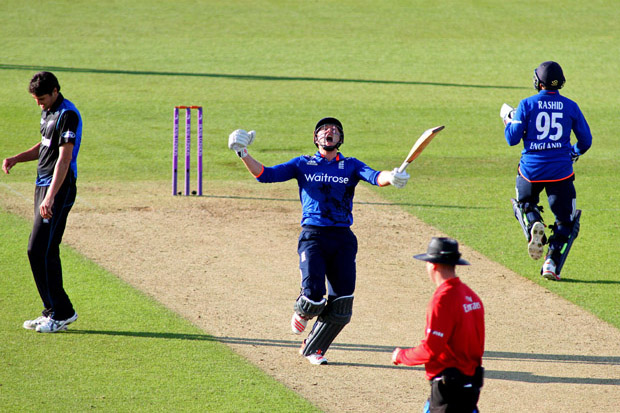Something wonderful is happening in English cricket. The Ashes are upon us and, at last, the England team seem determined to play the right way. The recent series against New Zealand was a revelation. The Kiwis’ have-a-go approach rubbed off and, for the first time in too long, England played as if cricket was more than a job. It could be fun too. Remember fun?
We have seen it before. In 1981, at Headingley, England were revived by the rustic virtues of what their captain Mike Brearley called ‘blacksmith cricket’. See ball, hit ball. Bowl as fast as you can. Keep it simple. Trust yourself.
For a long time England have approached cricket as though it was not a game but a military campaign. They talked of bowling ‘dry’ in ‘the right areas’, of applying ‘scoreboard pressure’. When the management praised the ‘brand of cricket’ the team played, you felt this was yet more evidence of a sport, and a hierarchy, that recognised the price of everything and the value of precious little. Cricket should be a matter of style, not branding, statistics or game theory.
The earnestness was supposed to demonstrate that England were the professionals’ professionals. Nothing would be left to chance. Everything could be planned, controlled, managed. Plug the right data into the right algorithm, and success would follow.
While England were winning, it was widely assumed that this meticulous preparation explained their success. Then, maintaining the same attention to detail, they started to lose. It became obvious, as it should have been all along, that much of their ‘professionalism’ was weapons-grade hokum: management furthering the interests of management.
When England toured Australia at the turn of last year — and lost 5–0 — they took with them an 82-page ‘dossier’ listing dietary ‘requirements’, one of which was the regular provision of ‘pumpkin seed and goji berry breakfast bars’. They took ‘professionalism’ beyond the reach of parody.
The paradox of sport is that successful sportsmen need space to focus and room to relax; freedom from distraction and time to think for themselves. Not every problem, as former England captain Kevin Pietersen observed, can be solved by another fitness session or team meeting. Sometimes hard work and tinkering exacerbates problems. The answer may well be less professionalism and a greater appreciation of the amateur spirit. Amateur, that is, in the sense of loving the game. Like the New Zealanders, Australia appreciate that managing professional players requires reducing, not increasing, pressure. Management’s role is to create an environment in which players can best employ the talent that earned them selection.
Darren Lehmann, the Australians’ impressively relaxed coach, understands that the promise of a beer or two at the close of play is worth more than hours spent in pattern analysis. In any case, as any struggling golfer knows, it is easy to overcomplicate sport. Adjustments may often be necessary but the fundamentals remain constant.
Trevor Bayliss, England’s new coach, has a reputation for adopting a low-key, low-profile approach in which the players lead. His attitude, according to the wicketkeeper Riki Wessels, is ‘chilled’. The former Sri Lankan captain Mahela Jayawardene, who was coached by Bayliss, has said: ‘He encourages a freedom for the boys on and off the field, for them to enjoy themselves and their cricket. A lot of the things he brought into the team were fun elements, allowing players to enjoy themselves, which in return led to a much more relaxed environment.’
Australia, led by Michael Clarke, will prove formidable opposition. The odds are against England. But in the likes of Joe Root, Jos Buttler, Ben Stokes and Moeen Ali, the home team has young men who play with the kind of freedom more often associated with their opponents.
England may lose more than they win this summer but if they play with the right spirit, they will be admired nonetheless. The country desperately wants to fall back in love with its cricketers. Alastair Cook’s men just need to let that romance blossom. Have a go. Be not afraid. Have fun.
Got something to add? Join the discussion and comment below.
Get 10 issues for just $10
Subscribe to The Spectator Australia today for the next 10 magazine issues, plus full online access, for just $10.
You might disagree with half of it, but you’ll enjoy reading all of it. Try your first month for free, then just $2 a week for the remainder of your first year.















Comments
Don't miss out
Join the conversation with other Spectator Australia readers. Subscribe to leave a comment.
SUBSCRIBEAlready a subscriber? Log in